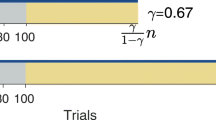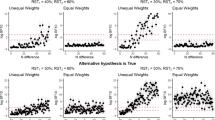Abstract
The role of multiple attributes in consumer choice has received much attention from marketers. This literature, however, is essenti ally deterministic. Yet, in regard to predictive accuracy, these mod els have not performed as well as expected. Bass, Pessemier, and Lehmann (1972), in particular, have stressed the extent to which brand switching is observed in individual behavior. Bass (1974) and Herniter (1972) have proposed a model of stochastic preference to account for brand-switching behavior. In this paper, we relate these contributions to the multiattributed consumer choice models. A general framework of analysis is proposed to model multiattributed consumer preference. It is then shown that the origin of the brand-switching phenomenon is to be found in the interaction of the multiplicity of evaluative dimensions for the choice alternatives and the consumer uncertainty over salient attributes and alternative performance on these attributes. Finally, the applicability of this methodology to other existing multiattribute choice models is briefly discussed.
Access this chapter
Tax calculation will be finalised at checkout
Purchases are for personal use only
Preview
Unable to display preview. Download preview PDF.
Similar content being viewed by others
References
Bass, F. M., “The Theory of Stochastic Preference and Brand Switching,” J. of Mktg. Res.11, No. 1 (Feb. 1974), pp. 1–20.
Bass, F. M., A. Jeuland, and G. Wright, “Equilibrium Stochastic Choice and Market Penetration Theories: Derivation and Comparisons,” Mgmt. Sc., 22, No, 10, (June 1970).
Bass, F. M., E. A. Pessemier, and D. R. Lehmann, “An Experimental Study of Relationships Between Attitudes, Brand Preference, and Choice,” Beh. Sc., 17, No. 6 (Nov. 1972), pp.532–541.
Bernardo, J. and J. M. Blin, “A Mathematical Model of Consumer Choice Among Multi-attributed Brands,” J, of Consumer Res., (Sept. 1977).
Birkhoff, G., “Tres observaciones sobre el algebra lineal,” Universidad Nacional de Tucuman, Revista, Series A., 5, (1946) pp.147–151.
Blin, J. M., “A Linear Assignment Formulation of the Multi-Attribute Decision Problem,” Revue Francaise d’Automatique d’lnformatique et de Recherche Operationnelle, 6, No. 2 (June 1976).
Fishbein, M., “Attitude and the Prediction of Behavior,” in M. Fishbein (ed.) Readings in Attitude Theory. New York: Wiley 1967, pp.477–492.
Herniter, J., “An Entropy Model of Brand Purchase Behavior,” J. of Mktg. Res., 10 (Nov. 1973), pp.361–375.
Lancaster, K. J., “A New Approach to Consumer Theory,” J. of Pol. Ec, 74 (1966), pp.132–157.
May, K. O., “Intransitivity, Utility and the Aggregation of Preference Patterns,” Econometrica, 22 (Jan. 1954), pp.1–13.
Pekelman, D. and S. K. Sen, “Mathematical Programming Models for the Determination of Attribute Weights,” Mgmt. Sc., 20 (April 1974), pp.1217–1229.
Pessemier, E. A., “Market Darwinism, Choice Theory and Marketing Models,” in Mazze, Edward M. (ed.) 1975 Combined Proceedings, Am. Mktg. Assoc. (Aug. 1975), pp.27–30.
Slovic, P. and S. Lichtenstein, “Comparison of Bayesian and Regression Approaches to the Study of Information Processing in Judgment,” Org. Beh. and Human Performance, 6, No. 6 (Nov. 1971), pp.649–744.
Srinivasan, V. and A. D. Shocker, “Linear Programming Techniques for Multidimensional Analysis of Preferences,” Psychometrika, 38, No. 3 (Sept. 1973), pp.337–369.
Theil, H., “A Theory of Rational Random Behavior,” J. of the Am. Stat. Assoc. 69, No. 346 (June 1974), pp.310–314.
Tversky, A., “Elimination by Aspects: A Theory of Choice,” Psych. Rev. 79, No. 4 (July 1972), pp.281–299.
von Neumann, J., “A Certain Zero-Sum Two-Person Game Equivalent To The Optimal Assignment Problem” in H. W. Kuhn and A. W. Tucker (eds.) Contributions to the Theory of Games, 2, Princeton Univ. Press, 1953, pp.5–12.
Author information
Authors and Affiliations
Editor information
Editors and Affiliations
Rights and permissions
Copyright information
© 1978 Springer-Verlag Berlin Heidelberg
About this paper
Cite this paper
Blin, J.M., Dodson, J.A. (1978). A Multiple Criteria Decision Model for Repeated Choice Situations. In: Zionts, S. (eds) Multiple Criteria Problem Solving. Lecture Notes in Economics and Mathematical Systems, vol 155. Springer, Berlin, Heidelberg. https://doi.org/10.1007/978-3-642-46368-6_2
Download citation
DOI: https://doi.org/10.1007/978-3-642-46368-6_2
Publisher Name: Springer, Berlin, Heidelberg
Print ISBN: 978-3-540-08661-1
Online ISBN: 978-3-642-46368-6
eBook Packages: Springer Book Archive




